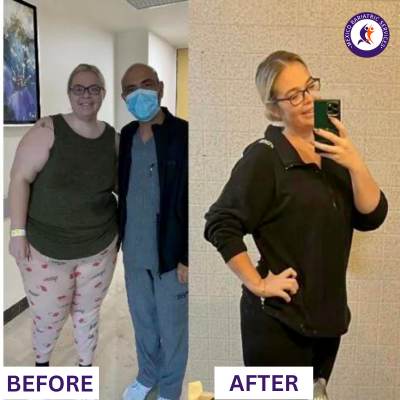Discover Low-Cost Gastric Bypass in Puerto Vallarta
Explore gastric bypass in Puerto Vallarta, where quality treatment costs 60% less than in the US. Learn more about Puerto Vallarta’s surgery cost, all-inclusive packages, and skilled surgeons below.
Gastric Bypass in Puerto Vallarta Patient Reviews
Choosing the right obesity treatment option is difficult, but reviews can help. Read inspiring stories from previous patients to learn from their experiences.
Before and After Gastric Bypass in Puerto Vallarta
It’s natural to have questions about the effectiveness of gastric bypass in Puerto Vallarta.
You can look at the before and after photographs of our past patients and witness the transformations yourself.


How Much Does Gastric Bypass Cost in Puerto Vallarta, Mexico?
A gastric bypass in Puerto Vallarta costs $6,900. The same costs $19,000 in the US and $17,000 in Canada. Moreover, this price involves your hospital stay, transportation, and medical expenses in Puerto Vallarta making it an all-inclusive package.
Gastric bypass cost in Puerto Vallarta, Mexico, is almost 60% cheaper.
Gastric Bypass in Puerto Vallarta vs US & Canada
| Procedure | Nuevo Laredo | US | Canada |
|---|---|---|---|
| Gastric Bypass | $6,900 | $19,000 | $17,000 |
*Prices are case-dependent.
Note that US/Canada prices are for self-funded or cash-pay patients.
Gastric bypass for foreigners in Puerto Vallarta assures quality care with cost savings.
Ready to take the first step?
Gastric Bypass All-Inclusive Package
Our comprehensive gastric bypass package starts at $6,900 and includes everything you need for a hassle-free treatment.
Here is what our package includes:
- Hospital Fees: Hospital expenses during your treatment
- Surgeon Fees: Surgeon fees and expenses for your treatment
- Food and Beverages: Cost of food and beverages during your hotel stay
- Hospital Nights: Stay at the hospital for treatment, recovery, and observation
- Post-Op Medications: Including antibiotics, antacids, pain medication, reflux & nausea medication, antiseptics, and more
- Aftercare Support: Meal guides from nutritionists, access to support groups, and weight loss help in the community moderated by dieticians
- Nutritionist Support: Pre and post-op nutritionist consultations from our U.S.-registered dietician, Katelyn J. Mock
- Private Transportation: Logistics and transportation to and from the hospital and the hotel, including airport transfer (Restrictions apply)
- Pre & Post-Op Tests: Lab tests before and after the surgery to check the state of your body
Gastric Bypass All-Inclusive Package in Puerto Vallarta
| Procedure | Price | Hospital Nights | Hotel Nights |
|---|---|---|---|
| Gastric Bypass | $6,900 | 1 night | 2 nights |
| Mini Gastric Bypass | $6,900 | 1 night | 2 nights |
Top Hospital for Gastric Bypass in Puerto Vallarta
Hospital CMQ Premiere, a leader in healthcare in Puerto Vallarta, is renowned for its surgical excellence, exceptional patient care, and state-of-the-art surgical facility.
The hospital is equipped for complex surgeries, employs experienced staff, and offers several weight loss solutions.
Features:

Bariatric Surgeon in Puerto Vallarta for Gastric Bypass
Meet Dr. Sergio del Hoyo, a leading expert in gastric bypass in Puerto Vallarta with over 15 years of experience.

Dr. Sergio del Hoyo
Education: Sciences University Center, University of Guadalajara, School of Medicine, Guadalajara, Mexico
Experience: 15 years
Membership/ Accreditation:
Other Information:
Want to know if you qualify for the surgery?
Gastric Bypass Surgery in Puerto Vallarta
Gastric bypass surgery is a combination of both restrictive and malabsorptive approaches to facilitate significant weight loss.[1]Stanford Healthcare
Gastric Bypass Surgery in Puerto Vallarta
“Roux-en-Y gastric bypass, the most commonly performed bariatric procedure, is both malabsorptive and restrictive.”
View in Article
Here is an in-depth look at the procedure:
1. Initial Consultation Process and Evaluation:
You undergo a thorough medical evaluation before the surgery. This includes discussing medical history, current health status, and weight loss goals.
The review ensures that you are a good candidate for the surgery and understand the commitment required post-surgery.
2. Pre-Surgery Preparation:
All patients receive detailed instructions on preparing for the surgery, including dietary restrictions and medication adjustments.
This preparation is crucial for minimizing surgery risks and improving outcomes.
3. Anesthesia Administration:
On the day of surgery, you are administered general anesthesia, ensuring you remain unconscious and pain-free throughout the procedure.
4. Surgical Procedure:
The surgery typically involves two main steps:
Creating the Stomach Pouch:
Bypassing the Small Intestine:
The most common type of gastric bypass surgery is Roux-en-Y bypass (RGB).
Most bariatric surgeons perform the surgery using laparoscopic techniques, making the procedure minimally invasive.
You can look forward to losing almost half, or even more, of your excessive weight in the first couple of years after your gastric bypass surgery.
* Weight loss results may vary.
5. Post-Op Care:
You are monitored in the recovery room immediately after surgery. Vital signs are checked regularly, and pain management is a priority.
6. Hospital Stay:
The typical hospital stay in Puerto Vallarta for gastric bypass surgery is 1-2 days. During this time, you start on a liquid diet and are gradually introduced to soft foods.
7. Recovery and Follow-up:
Most patients spend approximately 2-3 days in Puerto Vallarta post-discharge for recovery and follow-up consultations.
Dietary guidelines, lifestyle adjustments, and activity recommendations are provided to ensure successful long-term weight loss, management of weight comorbidities, and health improvement.
8. Long-term Lifestyle Changes:
You must adhere to a nutritionally balanced diet and regular physical activity post-surgery. Regular follow-up appointments are crucial for monitoring health and nutritional status.
9. Support and Counseling:
Our patients get exclusive access to moderated support groups and aftercare services to help them adapt to their new dietary and exercise habits.
10. Returning Home:
Once cleared by the medical team, you can return home equipped with a comprehensive plan for your new lifestyle and dietary changes.
The following table provides an overview of the typical surgery experience in Puerto Vallarta:
| Procedure Duration | Hospital Days | Hotel Days | Invasiveness |
|---|---|---|---|
| 2-4 hrs | 1-2 Days | 2-3 Days | Minimally invasive |

Gastric Bypass vs Gastric Sleeve
Gastric bypass and gastric sleeve are both common weight loss surgery (WLS) procedures. When considering bariatric surgery in Puerto Vallarta, it’s crucial to understand the differences between gastric bypass and gastric sleeve procedures.
Here’s a detailed comparison to help you make an informed decision:
Gastric Bypass vs Gastric Sleeve in Puerto Vallarta, Mexico
| Feature | Gastric Bypass | Gastric Sleeve |
|---|---|---|
| Procedure Type | Combination of restrictive and malabsorptive | Primarily restrictive |
| Surgery Duration | 2-3 hours | 1-2 hours |
| Hospital Stay | 2-3 days | 2-3 days |
| Expected Weight Loss | 60-80% of excess weight in 1-2 years | 50-70% of excess weight in 1-2 years |
| Nutritional Considerations | More complex and requires supplements | Less risk of nutrient deficiencies |
| Reversibility | Difficult to reverse | Irreversible |
| Effectiveness for Treating Comorbidities | Highly effective for diabetes, hypertension | Effective, especially for reducing appetite |
| Recovery Times | Slightly longer due to the complexity | Generally quicker recovery |
Source: Healthline[3]Healthline
Gastric Sleeve vs. Gastric Bypass
“What’s the difference between gastric sleeve surgery and gastric bypass surgery?”
View in Article
Gastric sleeve in Puerto Vallarta, Mexico, and gastric bypass are both effective weight-loss surgeries. Your choice should depend on your medical history, weight loss goals, and doctor’s recommendation.

Mini Gastric Bypass
Mini gastric bypass (MGB) in Puerto Vallarta is a less invasive alternative to traditional gastric bypass.[4]NCBI
Mini Gastric Bypass
“determining the exclusion of part of the stomach, duodenum, and proximal jejunum from the food pathway”
View in Article It entails:
- Stomach Division: A small pouch is created at the stomach’s top, reducing its size more significantly than in a standard gastric bypass.
- Intestinal Bypass: The small intestine is rerouted to this pouch, bypassing a larger portion of the intestine compared to traditional bypass, leading to more efficient calorie absorption reduction.

Mini gastric bypass differs from traditional gastric bypass in these ways:
- Surgical Technique: Mini gastric bypass creates a long narrow tube from the stomach and reroutes a larger portion of the small intestine, simplifying the procedure compared to traditional bypass, where the stomach is divided into two pouches.
- Intestinal Bypass Length: It involves bypassing a longer segment of the intestine, leading to more significant malabsorption and potential weight loss.
- Recovery and Duration: This procedure is generally quicker with a shorter recovery time due to its less complex nature.
- Risks and Outcomes: While effective for weight loss, mini gastric bypass has a different risk profile, including a higher potential for nutritional deficiencies.
Gastric Bypass Success Rate
Gastric bypass surgery, specifically the Roux-en-Y gastric bypass (RYGB), has shown significant long-term success.
Here is some key information you need to know:
Gastric Bypass Recovery
Recovering from gastric bypass surgery involves a structured timeline and specific phases, each critical for a successful outcome and long-term health improvement.[8]UCSF Health
Gastric Bypass Recovery
“Your surgeon will decide when you’re ready to go home, based on your progress.”
View in Article
Here is a breakdown of the recovery process, along with essential post-operative care instructions:
Immediate Post-Operative Phase (First 48-72 Hours)
Early Recovery Phase (First 2-6 Weeks)
Late Recovery Phase (6 Weeks to 3 Months)
Long-Term Recovery and Maintenance (3 Months and Beyond)
Gastric Bypass Complications
While gastric bypass surgery is generally safe, like any major surgery, it comes with potential risks and complications.[9]Stanford Healthcare
Gastric Bypass Complications
“Gastric bypass surgeries can be extremely successful in helping patients suffering from obesity lose weight. But all surgery involves some risks.”
View in Article
Being aware of these risks and understanding post-operative care is crucial for you. Here’s an overview of the potential complications and risk management strategies:
Surgical Risks
Long-Term Complications
Risk Management and Post-Operative Care
Explore Gastric Bypass in Other Mexican Cities!
Your Puerto Vallarta Itinerary with MBS
Get personalized care with Mexico Bariatric Services (MBS) in Puerto Vallarta.
We meticulously plan every step of your gastric bypass surgery for a smooth and comfortable experience.
Before the Surgery
During the Surgery
After the Surgery
Let’s check out your itinerary from day 1 to day 4!
Arrival and Preparation
Surgery Day
- Shuttle to Hospital: Transportation is provided to the hospital.
- Pre-Op Lab Tests and Consultations: Undergo essential lab tests and meet with your surgical team for pre-op consultations.
- Surgery: Proceed with the gastric bypass surgery, followed by recovery in the hospital.
Post-Op Monitoring
- Inter-Operative Leak Tests (IOTL): Undergo leak tests to ensure the success of the surgery.
- Liquid Tests: Begin your post-op diet with liquid tests.
- Post-Op Diet Consultation: Receive guidance on your post-operative diet and nutrition.
Transition to Recovery
- Hospital Discharge: After ensuring your stable condition, you’ll be discharged.
- Return to Hotel: Transport back to your hotel, where you will continue to recover.
With MBS in Puerto Vallarta, your entire journey is planned with surgical precision, ensuring a stress-free experience focused on your health and well-being.
Are You a Candidate for Gastric Bypass in Puerto Vallarta?
Determining your candidacy for gastric bypass surgery depends mainly on your Body Mass Index (BMI).
Source: ASMBS[10]ASMBS
Is Metabolic and Bariatric Surgery Right for You?
“in individuals with BMI of 30–34.9 kg/m2 who do not achieve substantial or durable weight loss or co-morbidity improvement using nonsurgical methods.”
View in Article
Is Gastric Bypass in Puerto Vallarta Safe?
Conclusion
Gastric bypass in Puerto Vallarta is a safe, effective, and life-changing option for those seeking weight loss surgery in Mexico.
It includes top bariatric surgeons in Mexico, accredited facilities, cost savings with inclusive packages, and a supportive recovery environment.
FAQs
Take the first step to a new you!
References
- Stanford Healthcare: Gastric Bypass Surgery in Puerto Vallarta
- Stanford Healthcare: Surgical Procedure
- Healthline: Gastric Sleeve vs. Gastric Bypass
- NCBI: Mini Gastric Bypass
- NCBI: Long-term Weight Loss
- NCBI: Type-2 Diabetes Remission
- Jama network: Sustained Weight Loss
- UCSF Health: Gastric Bypass Recovery
- Stanford Healthcare: Gastric Bypass Complications
- ASMBS: Is Metabolic and Bariatric Surgery Right for You?
- Numbeo: Is Gastric Bypass in Puerto Vallarta Safe?
- Travel Safe Abroad: Is Gastric Bypass in Puerto Vallarta Safe?

